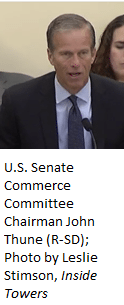
U.S. Senate Commerce Committee Chairman John Thune (R-SD), said during a hearing on Wednesday, “I have no doubt Lifeline provides a critical service, but I think we need an honest assessment” of its financial operations and how it distributes funds given those findings.
Seto Badoyan, Director, Forensic Audits & Investigative Service, GAO, told lawmakers, the GAO recommended the FCC move Lifeline funds, now kept in a private bank account, into the U.S. Treasury where there would be greater financial controls to prevent fraud, waste and abuse. During its audit, GAO investigators tried using fake names to sign up for Lifeline and were successful in several attempts. The FCC agreed to all seven GAO recommendations, he said.
While the Lifeline purpose is noble, it’s “not an effective means of achieving its goals,” said Dr. Jeffrey Eisenach, visiting scholar, American Enterprise Institute. Careful to emphasize he was testifying about his own personal beliefs, Eisenach said the program wastes taxpayer money and costs more than it should, to the tune of $1,100 annually, for each of the 12 million subscribers. He suggested lawmakers come up with a different approach. “We need an alternative; it’s time to consider a new delivery system that does not involve the government and the telephone companies that profit from the program,” said Eisenach. That’s because providers are paid a certain amount for every user they sign up.
States must remain involved in qualifying who is an eligible user, said Commissioner Chris Nelson, South Dakota Public Utilities Commission. “Every fraudulent Lifeline subscription is literally a theft,” from legitimate users and from other programs, he said.
The FCC intends to roll out a national verification system for Lifeline in phases, starting with six states in December and fully rolled out in 2019. Nelson and most of the other witnesses suggested Congress wait and see how the new verification process works before considering scrapping Lifeline. The tricky part is the national system will need to tap into many state databases to verify eligibility for those who want to enroll in Lifeline, and it will take awhile to get those agreements worked out.
Jessica Gonzalez, Deputy Director & General Counsel, Free Press, was on Lifeline for a while after she was laid off from a teaching job. She used it to have a phone number on her resume while she applied to and attended law school. Retaining the program is imperative for the low-income people who use it, she said. “People shouldn’t have to chose between food and internet access.”
September 7, 2017




Reader Interactions